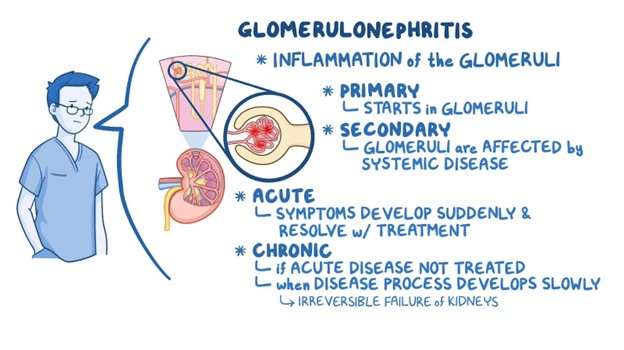A toddler diagnosed with nephrotic syndrome has a nursing diagnosis of excess fluid related to fluid accumulation (generalized edema). Which nursing intervention would be the priority to include in the nursing plan of care?
Seizure Precautions
Ambulation
Daily weight
Keep bed position flat
The Correct Answer is C
A) Seizure Precautions:
While seizure precautions are important in certain clinical situations, they are not directly related to the excess fluid and generalized edema associated with nephrotic syndrome. Nephrotic syndrome is primarily characterized by proteinuria, hypoalbuminemia, and fluid retention, which can lead to edema. Seizure precautions would not directly address the fluid imbalance in this context.
B) Ambulation:
Ambulation involves walking or movement and is not a priority intervention for addressing excess fluid and generalized edema. The primary concern in nephrotic syndrome with fluid accumulation is to manage the fluid balance and prevent further complications related to edema, such as respiratory distress or compromised circulation.
C) Daily weight:
This is the correct priority intervention. Daily weight monitoring is crucial in managing fluid balance and assessing the effectiveness of treatment in a child with nephrotic syndrome and fluid accumulation. Sudden weight gain can indicate worsening edema, while weight loss might indicate a response to treatment. Daily weight monitoring provides essential information to adjust fluid and medication management accordingly.
D) Keep bed position flat:
While maintaining a flat bed position may help improve venous return and fluid distribution, it is not the priority intervention for managing excess fluid and generalized edema in a child with nephrotic syndrome. Monitoring daily weight and adjusting treatment based on weight changes are more directly related to addressing the fluid imbalance.
Nursing Test Bank
Naxlex Comprehensive Predictor Exams
Related Questions
Correct Answer is D
Explanation
A) Absence of proteinuria:
Chronic glomerulonephritis often involves damage to the glomeruli in the kidneys, which can lead to the leakage of protein into the urine, resulting in proteinuria. The absence of proteinuria would be an unexpected finding in a patient with chronic glomerulonephritis. Therefore, this choice is incorrect.
B) Serum phosphorus 4.0 mg/dL (within expected reference range):
Serum phosphorus levels within the expected reference range are not directly related to chronic glomerulonephritis. While abnormalities in electrolyte levels might occur due to kidney dysfunction, serum phosphorus within the normal range is not a hallmark finding of glomerulonephritis. Therefore, this choice is incorrect.
C) Serum potassium 3.8 mEq/L (within the expected reference range):
Similar to serum phosphorus, serum potassium levels within the normal range are not specific to chronic glomerulonephritis. Kidney dysfunction can indeed affect electrolyte levels, but a serum potassium level within the normal range doesn't provide specific information about glomerulonephritis. Therefore, this choice is incorrect.
D) BUN 50 mg/dL (elevated):
Blood Urea Nitrogen (BUN) is a waste product that is filtered by the kidneys. Elevated BUN levels indicate impaired kidney function, as the kidneys are less efficient at filtering and excreting waste products. Chronic glomerulonephritis can lead to progressive kidney damage, which can result in elevated BUN levels due to decreased filtration and clearance. Therefore, an elevated BUN level is an expected finding in a patient with chronic glomerulonephritis.

Correct Answer is D
Explanation
A. Polyuria (excessive urination) is not a symptom of hypoglycemia; it is more commonly associated with hyperglycemia (high blood sugar).
B. Deep rapid respirations are more characteristic of diabetic ketoacidosis (DKA), a complication of uncontrolled diabetes that leads to high blood sugar levels and metabolic acidosis.
C. Dry, flushed skin is not a typical symptom of hypoglycemia; it might be associated with conditions like dehydration or heat exposure, but not with low blood sugar.
D. Tachycardia
Explanation: The symptoms described by the adolescent (feeling shaky, difficulty speaking, difficulty concentrating) along with a blood glucose level of 55 mg/dL indicate hypoglycemia, which is low blood sugar. Tachycardia, or a rapid heart rate, is a common physiological response to hypoglycemia. The body increases the heart rate in an attempt to improve blood flow and deliver glucose to the brain and other vital organs. This is part of the body's fight-or-flight response to low blood sugar.
Whether you are a student looking to ace your exams or a practicing nurse seeking to enhance your expertise , our nursing education contents will empower you with the confidence and competence to make a difference in the lives of patients and become a respected leader in the healthcare field.
Visit Naxlex, invest in your future and unlock endless possibilities with our unparalleled nursing education contents today
Report Wrong Answer on the Current Question
Do you disagree with the answer? If yes, what is your expected answer? Explain.
Kindly be descriptive with the issue you are facing.
